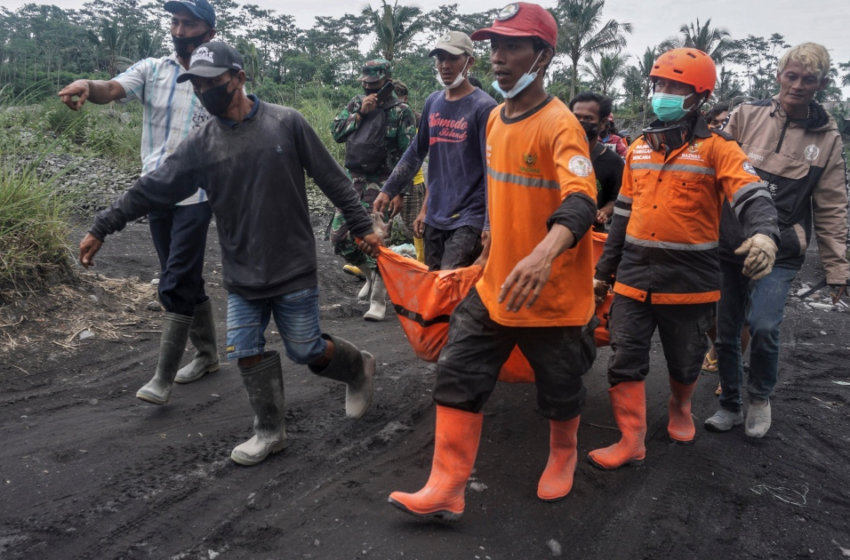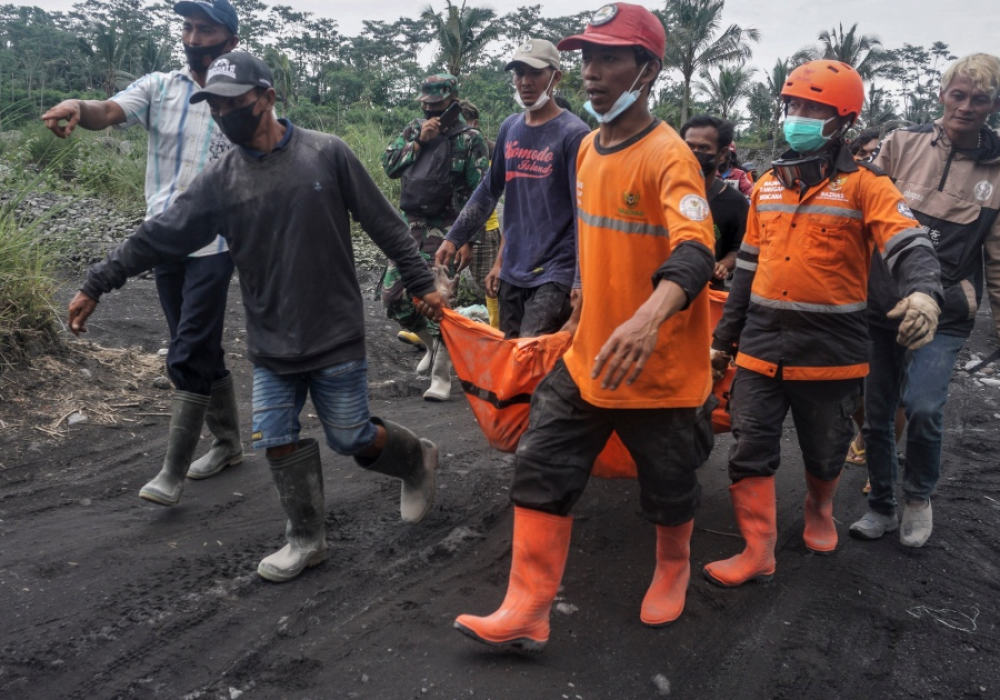Officials say at least 14 people killed and 98 injured after Mount Semeru’s sudden eruption.
The death toll following the eruption of Indonesia’s Semeru volcano has risen to 14, officials said, as rescuers searched villages blanketed in molten ash for survivors.
In a statement on Sunday, a spokesman for Indonesia’s disaster mitigation agency (BNPB) said two of the 14 people killed by the eruption have been identified.
The spokesman, Abdul Muhari, said at least 98 people have been injured, including two pregnant women, while 902 people have been evacuated from the villages surrounding Semeru in the East Java Province.
As many as 10 trapped people were rescued from villages in East Java’s Lumajang district, according to officials, with broadcaster Kompas reporting that those rescued were workers at a sand mining site.
The volcano, located on Indonesia’s most densely populated island of Java, erupted on Saturday, spewing columns of ash more than 12 kilometres (7.5 miles) into the sky, and sending searing gas and lava flowing down its slopes.
Several villages in Lumajang were blanketed by ash. Houses and vehicles were submerged while livestock were smothered.
 Damaged houses covered by volcanic ash spewed out of Mount Semeru in Sumber Wuluh Village. [Umarul Faruq/Antara Foto via Reuters]
Damaged houses covered by volcanic ash spewed out of Mount Semeru in Sumber Wuluh Village. [Umarul Faruq/Antara Foto via Reuters]The sudden eruption was triggered by a thunderstorm and days of heavy rains, according to Eko Budi Lelono, who heads the geological survey centre.
He said the rains eroded and finally collapsed the lava dome atop the 3,676-meter (12,060-foot) Semeru.
Flows of searing gas and lava travelled up to 800 metres (2,624 feet) to a nearby river at least twice on Saturday, he said.
The BNPB has advised people to stay 5 kilometres (3.1 miles) from the crater’s mouth.
Thoriqul Haq, an official in Lumajang district, said “thick columns of ash have turned several villages to darkness” and that a power blackout in the area was hampering evacuation efforts.
Haq said the debris and lava mixed with rainfall formed thick mud that has destroyed the main bridge connecting Lumajang and the neighbouring district of Malang, as well as a smaller bridge.
The BNPB said it had sent aid to shelters, including food, tarpaulins, face masks, and body bags.
 People ride a motorbike on a road that is covered with volcanic ash following an eruption of the Semeru volcano in the village of Sumberwuluh, East Java province, Indonesia, December 4, 2021 [Antara Foto/Hermawan/via Reuters]
People ride a motorbike on a road that is covered with volcanic ash following an eruption of the Semeru volcano in the village of Sumberwuluh, East Java province, Indonesia, December 4, 2021 [Antara Foto/Hermawan/via Reuters]Semeru’s alert status has remained at its second-highest level since its previous major eruption in December 2020, which had also forced thousands to flee and left villages covered in ash.
There were no casualties at that time.
On Sunday, some residents who fled to a government shelter near Lumajang district’s head office said authorities had not conveyed any information to them about the volcano’s activities.
“Suddenly everything went dark, the bright afternoon turned into night. A rumbling sound and heat forced us to run to the mosque,” said Fatmah, a resident who fled to the shelter from Curah Kobokan, about 5km (3.1 miles) from the crater. “It was a far stronger eruption than in January.”
Indonesia, an archipelago of more than 270 million people, is prone to earthquakes and volcanic activity because it sits along the Pacific “Ring of Fire”, a horseshoe-shaped series of fault lines.
 Trucks covered by volcanic ash which is spewed out of Mount Semeru in Sumber Wuluh Village [Zabur Karuru/Antara Foto via Reuters]
Trucks covered by volcanic ash which is spewed out of Mount Semeru in Sumber Wuluh Village [Zabur Karuru/Antara Foto via Reuters]












